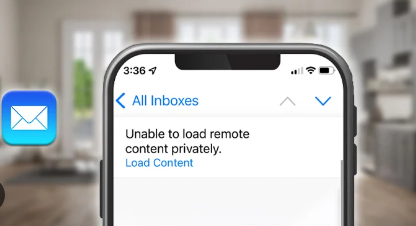Your Network Preferences Prevent Content From Loading Privately

Are you tired of not being able to load your favorite content privately? Do you feel like your network preferences are preventing you from accessing certain websites or articles? If so, don’t worry – you’re not alone. Many people struggle with this issue, but luckily there is a solution: private browsing. In this blog post, we’ll discuss how to change your network preferences and make the most of private browsing to access all the content you want without any restrictions!
The problem with loading content privately
When it comes to browsing the web, there are a variety of reasons why someone may want to do so privately. Perhaps they’re looking up sensitive information, or maybe they just don’t want their search history tracked. However, loading content privately can come with its own set of issues.
For one thing, some websites won’t load properly when you’re in private browsing mode. This could be due to network preferences that are set up on your device or browser.
In addition, even if the website does load properly, some features may not work as intended when you’re in private browsing mode. For example, you might not be able to save passwords or download files while in this mode.
It’s worth noting that private browsing isn’t foolproof – there is still a chance that your activity could be tracked by certain entities like internet service providers or government agencies. It’s important to keep this in mind and take additional steps if necessary to protect your privacy online.
How to change your network preferences
Changing your network preferences is important when it comes to loading content privately. Here’s how you can do it!
First, navigate to the settings menu on your browser. This can usually be found by clicking on the three dots in the upper-right corner of your window.
Next, scroll down until you find “Privacy and security.” Clicking on this option will bring up a list of preferences related to browsing privacy.
Look for an option that allows you to block third-party cookies or disable tracking. Enabling this preference will prevent websites from collecting data about your browsing habits.
You may also want to consider using a virtual private network (VPN) which encrypts all of your internet traffic and helps protect your online privacy even more.
By taking these steps, you’ll be able to browse the web with greater anonymity and keep prying eyes from tracking everything you do online.
The benefits of loading content privately
The benefits of loading content privately can be numerous, depending on your browsing habits and preferences. One of the biggest advantages is increased privacy and security. When you load content privately, your browser does not save cookies or other data that may track your online activity. This means that advertisers and other third-party entities cannot collect information about you without your knowledge or consent.
In addition to enhanced privacy, private browsing can also improve performance by preventing websites from storing large amounts of data on your device. This can lead to faster page loads and a more streamlined user experience overall.
Another benefit of private browsing is the ability to bypass geographic restrictions on certain websites or services. By hiding your IP address, you may be able to access content that would otherwise be unavailable in your region.
Loading content privately offers many advantages for those who value their privacy and want greater control over their online experience. Whether you’re concerned about tracking cookies or simply want a faster browsing experience, private browsing is definitely worth considering as an option for accessing the web securely and efficiently.
Why you should load content privately
When it comes to browsing the web, privacy should always be a top priority. Loading content privately can offer many benefits that you may not have considered before.
Firstly, loading content privately can help protect your personal information and online activity from being tracked by third parties. This is particularly important if you are using public Wi-Fi or accessing sensitive information such as bank accounts or medical records.
Additionally, private browsing allows you to avoid targeted advertisements that are often based on your previous search history and online behavior. By blocking these ads, you can enjoy a more streamlined and personalized browsing experience without compromising your privacy.
Moreover, private browsing also prevents websites from storing cookies on your device. Cookies are small files used by websites to remember user preferences and track their activity across different sites. By disabling cookies during private browsing sessions, you ensure that no website has access to this data after the session ends.
Ultimately, loading content privately gives users greater control over their online presence and helps maintain anonymity while surfing the web. With so many benefits at hand, there’s little reason not to take advantage of this useful feature in modern browsers!
How to make the most of private browsing
Private browsing can be a useful tool for protecting your online privacy. However, there are some tips and tricks you can use to make the most of private browsing.
Firstly, it’s important to understand that private browsing is not foolproof. It only prevents your browser from saving certain information like cookies or search history on your device. Private browsing does not encrypt traffic between you and the websites you visit, nor does it hide your IP address from your internet service provider.
Secondly, if you want to maximize the benefits of private browsing, consider using a VPN (virtual private network). A VPN will encrypt all traffic between your device and the internet while also masking your IP address.
Thirdly, clear any cookies or cache files before beginning a private browsing session. This will help ensure that no previous data is stored on your device.
Remember that while private browsing may protect information locally on your device, anything you share or post online still remains public and accessible by anyone who has access to those sites.
By following these tips and being aware of its limitations, private browsing can be an effective tool for protecting sensitive information online.
Conclusion
In today’s digital age, privacy is becoming an increasingly important aspect of our online experience. With the rise of cyber threats and data breaches, it’s more crucial than ever to take control of your online presence. By changing your network preferences to load content privately, you can enhance your privacy and security while browsing the web.
Private browsing offers a host of benefits such as increased anonymity, protection against tracking cookies, improved speed and performance, and access to regionally restricted content. With just a few simple steps, you can enable private browsing on any web browser.
However, it’s important to note that private browsing isn’t foolproof and doesn’t offer complete protection against all threats. It still requires caution when sharing personal information or downloading files from untrusted sources.
By using these tips outlined in this article effectively, you can make the most out of private browsing while protecting yourself from potential dangers on the internet. So go ahead and take control over your online privacy by switching to private mode today!
Read More: Cyclobenzaprine 10mg




